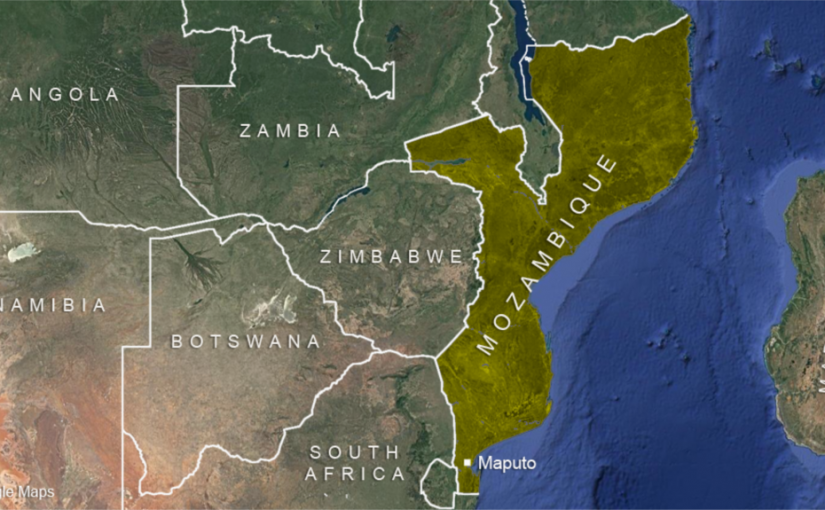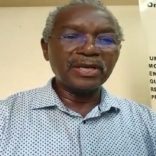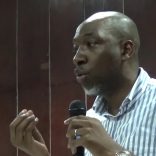Mozambique: More than 100 schools still closed in areas affected by rebel attacks
Mozambique: Palma siege + unnecessary hunger; timber scandal – By Joseph Hanlon

Map: VOA Portugues
In this issue:
Cabo Delgado
- Siege of Palma continues
- Palma hunger, ‘cabritismo’, and roots of war
- Ex-minister, prosecutor in timber scandal
- Pemba business man arrested for cake mix?
Other news
- Covid 19: Cases still high; deaths down slightly
- Helder Martins quits Covid-19 technical commission
- Big beasts fight over Africa
ALSO READ: Mozambique: British journalist expelled; restrictive press law proposed – By Joseph Hanlon
Siege of Palma continues
No food has arrived in Palma in two weeks, and supplies are running out. For months, insurgents have controlled the only paved road to Palma, the N380 through Macomia and Mocimboa da Praia. The only other route is a long dirt road from Montepuez through Mueda, Nangade and Pundanhar to Mueda.
After two successful relief convoys escorting trucks that arrived in Palma 31 January and 7 February, the military suddenly stopped escorting goods vehicles from Nangade to Palma. It is said helicopters and soldiers have been diverted to fight elsewhere; also the heavy rains have turned the dirt road to mud, making it impassable to all but 4×4 or 6×6 trucks. There have been attacks on the road and along the nearby Rovuma River border with Tanzania. Not on the Nangade-Palma road, but near by, there are recent reports of an attack on Quionga, 20 km north of Palma.
Late last week there were more than 50 trucks stuck in Nangade. The one guest house is full and there is nowhere for drivers to sleep. (Mediafax 18 Feb) Some have returned to Mueda. As a result, Palma is again going hungry, with dramatic price rises for basic goods.
WHO estimates that in an emergency, a person needs about 565 grams per day of food. The normal population of Palma is 37,000, and there are a similar number of displaced people in Palma. These 75,000 people need more than 42,000 kg of food per day – 42 tonnes per day. This city under siege needs 1260 tonnes of food per month – at present, it is getting none.
Comment Unnecessary hunger illustrates roots of war
The roads are closed and Palma does not have a proper port, but it has a slipway which can take medium size boats and landing craft. It can handle enough cargo to keep Palma fed. But local officials have banned its use.
As always, a fog of accusations and official actions obscures the matter. But it appears that important people in Palma wanted a share of the action which they did not receive, and are planning to build their own jetty and want to prevent competition. Until they build their slipway, no boats can land.
Mozambicans talk of “cabritismo” (goatism) which comes from the saying “O cabrito come onde esta amarrado” (a goat eats where it is tethered). What it means is that petty officials can only profit (“eat”) from what is within their purview. Thus the small Palma elite can profit from their control of land and the seacoast, but the gas boom makes that immensely more valuable.
The Mozambican word “cabritismo” goes back at least 25 years to the time of President Joaquim Chissano, when it was already being established. Since then Frelimo has built its power on total control of state administration through patron-client systems. At the top are the oligarchs who have national and provincial power. Below them are middle level officials who have power over land, licences, credits, etc and who demand to be part of any business – and who block both political and commercial opponents. These cabritos have dreams of setting up businesses or profiting from the existing one, like the Palma slipway, without any work on their part. And at the bottom are the small cabritos – the teachers who demand bribes for passing pupils or for school places, the police who set up check points purely for bribes, and so on.
The system has become totally institutionalised within Frelimo. The little cabritos are allowed to eat in their patch if they feed the bigger cabritos above them – in a chain all the way up to the oligarchs. And the system became particularly entrenched in Cabo Delgado, far away from Maputo. The number of cabritos grew to the point where they ate everything. Nothing was left for ordinary people. Poverty and inequality grew. Then came mineral wealth such as rubies and the gas. The dreams expanded. Oligarchs looked for millions of dollars. At the lowest level, it was a motor cycle or metal roof for a house.
The squeeze became tighter. With so many cabritos and the increasing centrality of Frelimo patronage, it became difficult to set up businesses and there were no jobs for young people. Local fundamentalist preachers said Sharia law would end cabritismo. And they attracted supporters. A civil war began – initially against Frelimo and its goats.
Three years later, Palma is hungry because even in war, the cabritos remain in power in Cabo Delgado. And the war will not end until that problem is solved. jh
Fighting continues in the region where Muidumbe, Mocimboa da Praia and Macomia districts meet, along the Messalo River and the N380 north-south road. There are reports of helicopter strikes and insurgent attacks. One of the battles was in Roma, on the road from Mueda to Mocimboa, just 31 km from Mueda and 61 km from Mocimboa. This is a boundary zone which has seen some of the heaviest fighting of the war. Government forces need to control this zone if they are to be able to move east to recapture Mocimboa da Praia, while insurgents want control to move west to attack Mueda.
Video said to have been made by DAG mercenary pilots in Cabo Delgado, date unknown, posted by Robert Young Pelton on 18 February: https://twitter.com/i/status/1362371506399899654
Ex-minister and prosecutor caught up in timber scandal
The illegal export of precious hard woods from Cabo Delgado has been an open scandal for two decades, from the 1998-2005 period when Jose Pacheco was governor of Cabo Delgado. Involvement in high places meant that high volumes of logs of valuable species such as umbila, chanfuta and jambire were sent to China and elsewhere.
The scandal became public again in December 2020 when 102 containers of timber seized by the courts was suddenly seen on a boat sailing out of Pemba port. Savana (19 Feb) did a detailed investigation which revealed high level involvement. The 102 containers of illegal timber destined for China were first detained in August 2020. Nine people were arrested: the Montepuez district director of SISE, the security services; four members of the district directorate of land, environment and development; three customs officials, and one police official.
Savana identifies two people as key in the case. Well connected timber trader Zhing Zhao who was arrested in January this year. And Isabel Nkavandeka, former minister for parliamentary affairs under President Armando Guebuza, whose timber export licence Zhing Zhao was using.
Nkavandeka is from Muidumbe district where she has a timber concession. She said that when the 102 containers were smuggled out of the country in January, she had removed the export licence from Zhao. Zitamar (19 Feb) says “business people involved in the timber sector in Cabo Delgado told Zitamar that Nkavandeka, a veteran of the liberation war, was heavily involved in the whole operation, but has managed to hide her name from the press and the public eye until now. Nkavandeka is one of a number of veterans of the armed struggle coming from the Mueda plateau involved in the precious timber business.”
When the wood was initially seized, Octavio Zilo, chief prosecutor of Cabo Delgado province, did not follow the normal practice of giving the case to a magistrate named by the attorney general’s office (CSMMP). Instead he appointed his close associate Rodrigo Munguambe to be in charge of the case. Munguambe set a low bail for detainees, which Zhao paid, and entrusted the seized wood to Zhao, the main suspect in the case, for safe keeping, contrary to a legal requirement to pass it to the National Conservation Areas Administration. Munguambe was finally taken off the case last month, January.
Munguambe had been suspended in 2014-15 for corruption charges while he was working for the public prosecutor of Maputo province. After his suspension, he was sent to Cabo Delgado, Munguambe was also the prosecutor in charge of the case of Andre Hanekom, the South African businessman in Palma who died in detention in 2019. He had been accused of financially supporting the insurgency. It is thought that he was caught up in business conflicts in Palma.
Comment: Not mentioned by Savana is Jose Pacheco, who was governor of Cabo Delgado when the timber trade began to boom, and who is named in various investigative reports for 15 years as controller of the timber trade, and who had good links in China. He was Minister of Interior 2005-9 and later became head of the Frelimo disciplinary body, the Verification Commission (2012-7), both powerful posts under Armando Guebuza (President 2005-15). He was foreign minister briefly under President Nyusi (2017-19).
Filipe Nyusi cannot stand again for President in 2024, and the jockeying for position and power to nominate the next candidate has already begun. Nyusi, Guebuza, and former President Joaquim Chissano all have power and followers within the party, and there is a small group that feels that the secret debt scandal and Cabo Delgado civil war show the weakness of the patronage-based party and there is a need to choose someone not linked to the factions.
Nyusi appears to consider Guebuza his biggest enemy and has taken various steps to keep Guebuza in check. His son Ndabi Guebuza is in jail awaiting trial in the hidden debts scandal. Pacheco and Nkavadeka are close allies of Guebuza, and the hardwood timber trade seems largely controlled by the Guebuza faction. So finally moving on timber in Cabo Delgado may also be an indirect reminder to Guebuza to back off. This struggle will continue. jh
Was Pemba cake shop owner arrested for having cake mix?
Pemba businessman Minoj Hassam, arrested 3 February and charged with having 180 kg of ephedrine, the basic chemical to make crystal meth, apparently only had cake mix, as his lawyer claimed.
The police showed bags labelled Biagio Cremfil which they said were really ephedrine. Hassam’s businesses include cake shops. His lawyer said the product could be bought in Maputo supermarkets. Carta de Mocambique (18 Feb) found it was not sold in supermarkets, but is distributed by a major Maputo food wholesaler, Kooc (https://www.facebook.com/koocmocambique/) The product is used for icing and cream fillings of cakes, and is made along with other baking products in a Mozambican factory by an Angolan company, Biagio. (https://biagio-industria.com/)
Crystal meth (methamphetamine) is increasing made in Afghanistan because the basic chemical, ephedrine, comes from a common local shrub. A good article has been published by LSE: http://bit.ly/2lMw8wc Crystal meth is increasingly included with shipments of heroin transiting Mozambique. But there have been no reports of either ephedrine imports or labs producing crystal meth in Mozambique. But it could be produced in Mozambique: An article in Undark (20 May 2020) notes that “one of the drug’s appeals, at least to producers, is that, unlike heroin, it can be manufactured with limited resources and equipment. Aside from the key ingredient of ephedrine … meth production only requires a handful of common chemicals, including red phosphorus and, often, iodine. With the requisite knowledge, a small meth lab can be built with nothing more than some simple kitchen glassware and a gas burner.” https://undark.org/2020/05/20/afghanistan-meth-ephedra/
Covid-19
- Cases remain high; deaths down slightly
There were 5517 new cases of Covid-19 last week, which is the same as the average of the previous five week, and 8 times the December levels. Deaths, however fell to 52 last week, down from 82 the previous week. This is the lowest in five weeks, but 7 times the December levels.
Cases have been reported in all provinces, but the highest percentages of active cases are in Maputo City (57%), Maputo province (13%), and Sofala (11%). Beira is the new hotspot with warnings about hospitals being overwhelmed. Cases are rising in Cabo Delgado, which had 19% of new cases reported today. https://www.facebook.com/miguel.de.brito1
- Ex-Health minister quits Covid-19 commission
Helder Martins, Mozambique’s first health minister (1975-80), has publicly quit the government’s Covid-19 Technical and Scientific Conditions. He cites three reasons: that the commission was forced to work in secret, that the commission was headed by a minister which “introduced political factors”, and that government ignored or did not ask commission advice.
The worst such case was the 18 December government decree which allowed the re-opening of casinos, bars and stalls selling alcoholic drinks. The commission was not consulted and would never have recommended such a step. This easing of restrictive measures “sent the signal to the public, and particularly to the Mozambican elite, that they should put an end to prevention measures” and “unleashed a second wave of the epidemic,” he wrote in his letter. The decision was reversed in mid-January, but by then huge damage had been done and there was a 9-fold increase in Covid-19 cases and deaths.
Martins also objected to the curfew imposed on the Greater Maputo Metropolitan Area. The recent history of public health did not suggest that such measures were effective. In the Commission, after intense debate, a consensus was finally reached, Martins said, on a curfew running from 23.00 to 04.00 or 05.00 at weekends. The current curfew in force for Greater Maputo runs from 21.00 to 04.00 every day of the week. It is impossible for people working in central Maputo and living in outer suburbs to get home on public transport y 21.00. “I cannot be regarded as an accomplice in such an unwise measure”, he wrote.
Martins says the Commission called repeatedly for the government to mobilise NGOs for the fight against Covid-19 because of Mozambique’s long history of NGOs working successfully on many other health issues, including vaccination campaigns, family planning, and the fight against HIV/AIDS. But government gave no significant role to NGOs.
Government insisted the Commission work in secret, which meant the government could take decisions “without any scientific basis and without anyone knowing what the Commission recommended”. Or, indeed, if it had been consulted. Martins argues that if the Commission had been open to society and to the media, then the political leadership itself “would have been better informed, more tranquil, less anxious, and less vulnerable to agendas transmitted by foreign television stations, giving news about the epidemic unfolding in countries with contexts completely different from our own”. (AIM 21 Feb in English; the full resignation letter in Portuguese was published by Carta de Mocambique on https://cartamz.com/index.php/politica/item/7296-ultima-hora-helder-martins-diz-basta-a-comissao-cientifica-nao-pode-ser-dirigida-por-um-politico)
Other news
- Africa becoming important in global turf battle
As the world’s big men fight for turf, Africa has is becoming a battle ground between the big powers, secondary powers who want to join the big league, and neo-colonists. Africa Intelligence (16 Feb) points out that all the big men are holding Africa summits in the next 18 months.
In 2021:
- April or May – EU summit with African leaders – Portugal wants to hold this while it is still EU president.
- 18 May – French summit on investment in Africa
- July – Africa-France summit
- September – Turkey-Africa summit
- No date set – Sino-African Cooperation Forum in Dakar.
For 2022, Russia, India, the UK and US all plan large Africa meetings.
The UK has told ambassadors to find 50% cuts in aid, as part of the end of the commitment to 0.7% of GDP for aid. (Guardian 27 Jan) Aid to Mozambique is already falling, from a peak of GBP 84 million ($115mn) in 2019/20 to a planned GBP 66 mn ($90 mn) in 2021/22 and GBP 64 mn ($88mn) in 2022/23.
By Joseph Hanlon












Leave a Reply
Be the First to Comment!
You must be logged in to post a comment.
You must be logged in to post a comment.